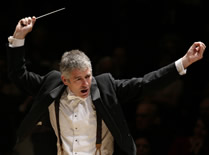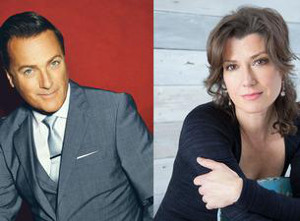It may seem that an opera premiered in 1954, and based on a novella published in 1898, might not be especially relevant to the twenty-first century, or contemporary life. But, to the contrary, the plot might almost have been drawn from today’s headlines. The Turn of the Screw explores a story of a young boy molested by an older man, although in the opera these details are so discreetly presented that a fellow audience member complained afterwards that had she not been to the pre-performance lecture she wouldn’t have known what the plot was about. “What was it about?” your reviewer inquired. “Homosexuality!” she replied.
Well, not quite, or not only. Henry James, the author of the novella, brilliant and canonic English author and expatriate New Yorker, is now widely agreed to have been a (perhaps not so-) closeted homosexual. Benjamin Britten, sixty years younger than James, could be openly gay, and knighted nonetheless. However, not only was Britten gay, but he seems to have had important relationships with a series of teenage boys, detailed in a scholarly biography by John Bridcut from 2006, Britten’s Children. Thus it is not surprising that the James novella, in which a new governess gradually learns about the dark past of the house, its two late employees (now ghosts), and the two seemingly innocent children, would appeal to Britten.
Such a plot provides all sort of musical opportunities — lyrical depiction of the countryside, young innocence, both for the governess and her wards, and high tension and ghostly voices from the beyond, as the governess is “gaslighted” (or does it to herself). For those with ears to hear, the man-child subtext is obvious throughout (sometimes disguised with Latin, as in a blasphemous parody of the liturgy of the Church of England — details of the filth can be seen in an article in the Guardian1), although it is only explicit at the very end.
In a world which can’t avoid knowing about the sexual abuse of countless boys by men who should have known better in the Catholic Church, this story must ring differently than perhaps it did in 1954. It is now hard to imagine the impact it made then, but Britten is certainly careful to avoid any moralizing or judgment in presenting the story. I find it hard to take any lesson or moral from the drama, just a certain feeling of unease, despite the beautiful music, and indeed, just as with other dramas from the past I wonder at the choice of this particular opera to revive.
Having made that choice, though, North Carolina Opera, with Keitaro Harada wielding the baton, and Jerome Davis as director, did a fine job, with an economical but visually convincing setting and costumes, and excellent musical values. The star of the show was Andrea Edith Moore as the Governess, with beautiful and clear tones, and every word and phrase distinct, and convincingly more and more distracted as the drama progressed. Her foil was Janice Meyerson as Mrs. Grose, the sort of contralto that always appears as a figure of fun in Gilbert and Sullivan, and who should most likely have been played as considerably older and more of a rustic figure than she was here. Meyerson can boast a fine, large voice, but at time her timbre interfered with the audibility of her words. The children were Hailey Best (Flora), playing a pre-teen convincingly, and boy soprano Asher Philips, who was not always perfect in tuning, but completely at home on stage. Benjamin Robinson was convincingly seductive as Peter Quint, although for dramatic reasons he was so far upstage for much of his singing that it did not carry well. Daniel Hinson as the narrator of the Prologue was excellent, with crystal clear diction.
This is a fine production, and one that I hope will encourage North Carolinians to support the company for many future operas. We deserve to have opera of this caliber.
1 http://www.guardian.co.uk/education/2002/jan/05/arts.highereducation












